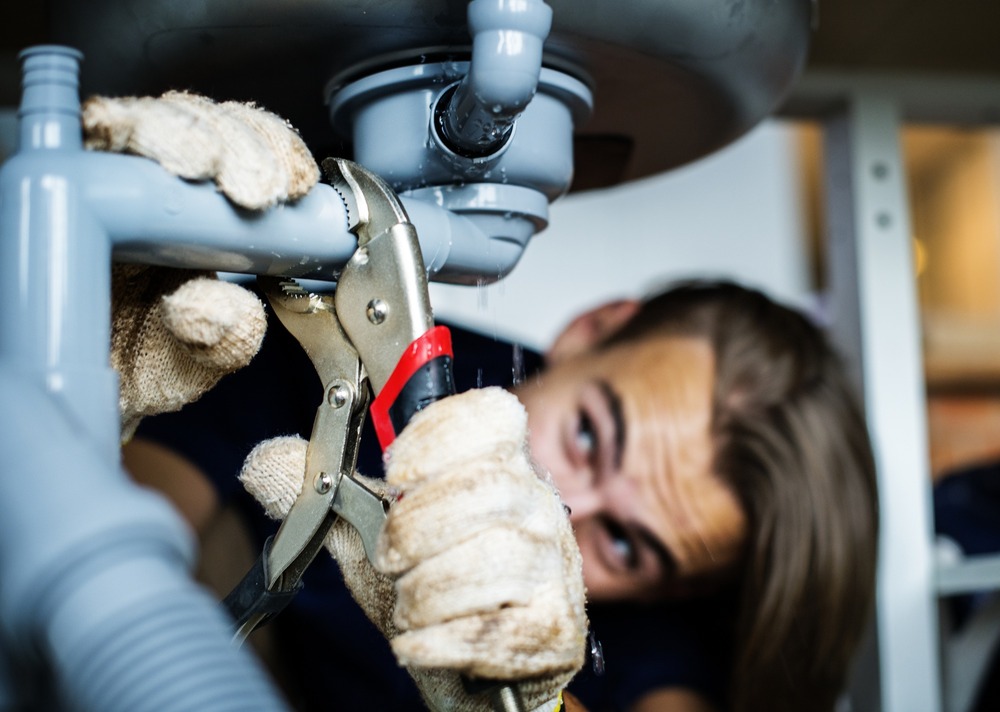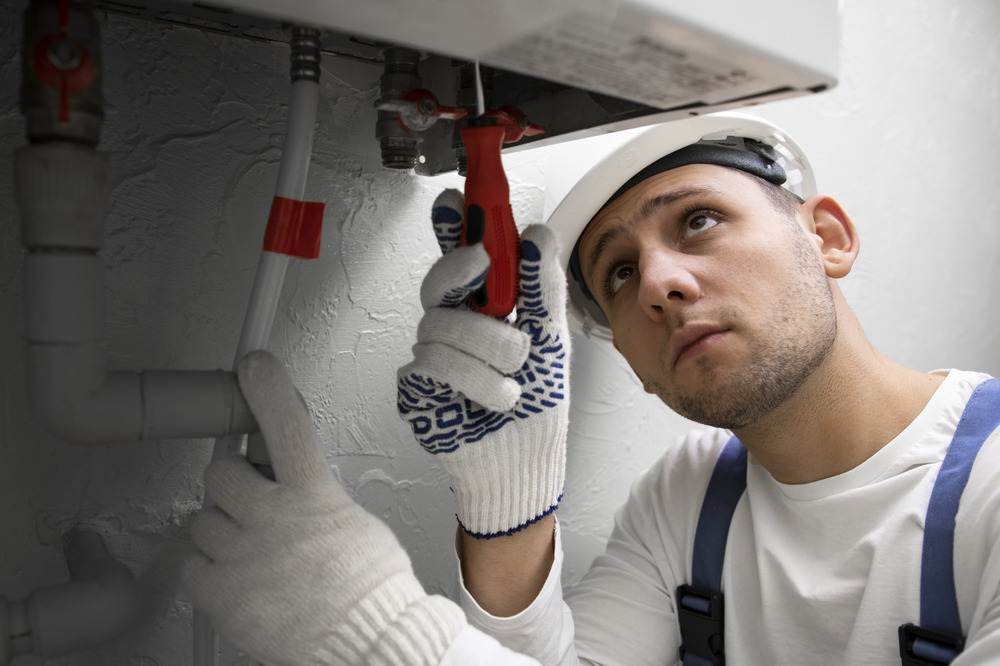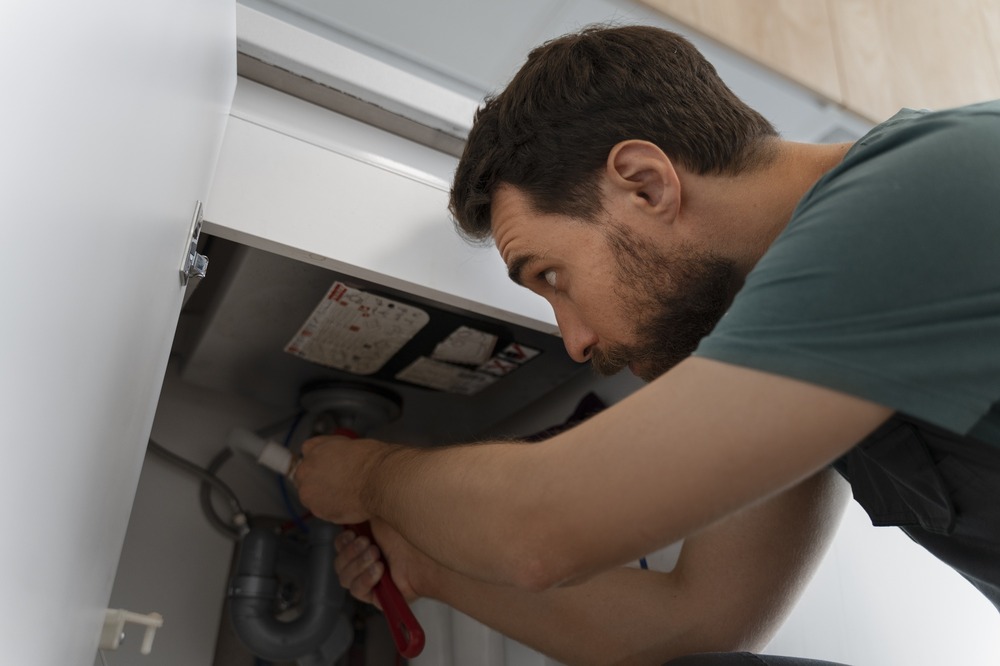From warm showers to clean dishes, hot water is an essential part of daily living. However, when water heater issues arise, they can disrupt routines, damage property, and even pose safety risks. Understanding the signs of trouble and knowing when to call an emergency plumber ensures timely solutions and peace of mind.
Here are the five common water heater problems, the reasons they occur, and how a professional emergency plumber in Torrington, CT, can address them.
Table of Contents
Key Takeaways✔ Sediment buildup, faulty thermostats, or undersized water heaters often cause inadequate hot water. ✔ Electrical faults, pilot light issues, or broken heating elements can lead to a total water heater failure. ✔ Unusual sounds like popping or hissing are usually caused by sediment buildup, pressure issues, or loose components. ✔ Bad smells in hot water are typically due to bacteria growth or a deteriorated anode rod. ✔ Corrosion, loose connections, or structural cracks can lead to water heater leaks. |

Why Prompt Action Matters for Water Heater Issues
Water heater problems often start small but can escalate quickly if left unaddressed. Delaying repairs can lead to:
- Higher Energy Bills: A malfunctioning unit uses more energy to heat water, significantly increasing utility costs. Water heating typically makes up about 18% of a home’s energy usage, making it the second-largest energy expense for most households. Over time, this added expense can surpass the cost of repairing or replacing the unit. Prompt action ensures the water heater operates at peak efficiency, saving money in the long run.
- Property Damage: Leaks and floods from a failing tank can ruin floors, walls, and belongings, leading to expensive repairs. Moisture from leaks can also encourage mold growth, which poses health risks and requires costly remediation. Addressing leaks immediately prevents extensive damage to the home.
- Safety Risks: Issues such as gas leaks, electrical faults, or water contamination can endanger household members. Gas leaks, in particular, present a serious fire and explosion hazard if left unattended. Swift intervention by an emergency plumber ensures the home remains safe for all occupants.
- Reduced Appliance Lifespan: Ignoring minor problems can accelerate wear and tear on the water heater, shortening its overall lifespan. Routine maintenance and timely repairs keep the system in optimal condition for years to come.
- Interruption to Daily Life: A faulty water heater disrupts essential activities like bathing, cooking, and cleaning. Extended downtime can be particularly challenging for larger households with higher water usage. Prompt repairs minimize these inconveniences and restore normalcy quickly.
Hiring an emergency plumber ensures these risks are mitigated swiftly, preventing minor issues from becoming major disasters. With professional help, homeowners can avoid unnecessary expenses, ensure safety, and maintain their quality of life.
https://www.youtube.com/watch?v=2C_fbqjBk-Y
5 Common Water Heater Issues That Call for an Emergency Plumber
Water heaters are essential for everyday comfort, but when they malfunction, they can cause significant inconvenience and even pose risks. Here are five common water heater issues that require the expertise of an emergency plumber to resolve swiftly and safely:
1. Insufficient Hot Water Supply
Running out of hot water quickly is one of the most common frustrations homeowners experience. This issue can disrupt routines like bathing or washing dishes, especially in larger households with high water demands. Several factors can contribute to insufficient hot water, including:
- Sediment Buildup: Minerals naturally found in water settle at the bottom of the tank over time, forming a thick layer of sediment. This layer acts as an insulator, making it harder for the heating element to transfer heat to the water efficiently. As a result, the water heater’s capacity and performance are reduced, leaving the household with less hot water than expected.
- Faulty Thermostat: The thermostat regulates the water heater’s temperature, and if it malfunctions, it can fail to heat the water to the desired level. This may result in water that is lukewarm or only slightly warm. In some cases, a faulty thermostat might also cause the water to overheat, posing a safety risk.
- Undersized Unit: If the water heater was not selected to meet the household’s needs, it may not be able to keep up with demand. This is particularly common in homes where family size or water usage has increased without upgrading the water heater. Overuse of an undersized unit can lead to frequent cycling and strain on the system.
An emergency plumber can evaluate the problem and recommend appropriate solutions, such as flushing the tank to remove sediment, repairing or replacing the thermostat, or upgrading to a larger unit better suited for the household’s needs.
While adjusting water usage patterns may provide temporary relief, professional assistance ensures the problem is resolved effectively and permanently.
2. Complete Unit Shutdown or Failure
A water heater that stops working entirely is a serious issue that requires immediate professional attention. Without hot water, essential activities such as showering, cooking, and cleaning become difficult or impossible, affecting the household’s overall comfort and hygiene. Common reasons for a complete shutdown include:
- Electrical Issues: A tripped circuit breaker or loose wiring can interrupt the power supply to the water heater, causing it to shut down. These issues may also result in inconsistent heating before the unit fails completely. Electrical faults should always be handled by a professional to prevent fire hazards or further system damage.
- Pilot Light Problems: In gas water heaters, the pilot light is essential for igniting the burner that heats the water. A pilot light that won’t stay lit could be caused by a faulty thermocouple, gas valve, or ventilation issue. These components need to be inspected and repaired promptly to restore the unit’s functionality.
- Broken Heating Elements: Electric water heaters rely on heating elements to warm the water, and when these components wear out, the unit stops working. Signs of failing heating elements may include water that is slow to heat or a complete lack of hot water. Replacing these elements requires specialized tools and expertise.
An emergency plumber can quickly identify the cause of the failure and restore the water heater to working condition, whether by repairing wiring, relighting the pilot light, or replacing broken parts. Attempting DIY fixes in these cases can lead to injury or additional damage, making professional intervention essential.
3. Strange Noises from the Water Heater
Hearing unusual sounds coming from the water heater can be alarming and often indicates that something is wrong. These noises not only disrupt household peace but may also signal serious underlying problems that, if ignored, could lead to costly repairs. Common causes of strange noises include:
- Sediment Hardening: When sediment builds up at the bottom of the tank, it can harden into a crust-like layer. This can cause popping or rumbling sounds as water becomes trapped beneath the sediment and turns to steam. Over time, this reduces the efficiency of the water heater and increases energy consumption.
- Water Pressure Issues: Excessive water pressure within the tank can cause hissing or banging noises, indicating that the system is under stress. High pressure can damage internal components and even lead to leaks if not addressed promptly. Installing a pressure relief valve can help manage pressure levels and protect the unit.
- Loose or Damaged Components: Parts like the dip tube, valves, or heating elements can loosen over time due to wear and tear. This can cause rattling or vibrating sounds during operation. If left unchecked, these loose components may lead to further damage or leaks.
An emergency plumber can inspect the water heater, drain the tank to remove sediment, and tighten or replace any faulty components. Addressing these noises early ensures the water heater continues to operate safely and efficiently.
4. Foul Odors in Hot Water
The presence of foul odors in hot water is more than just unpleasant; it can also indicate potential health risks. These odors can make everyday activities like bathing or cooking unbearable and may signal deeper issues with the water heater. Common causes of bad-smelling water include:
- Bacteria Growth: Water heaters set to low temperatures (below 120°F) can create an environment where bacteria thrive. This often results in a rotten egg smell caused by sulfur-producing bacteria. Increasing the water temperature temporarily or sanitizing the tank can help eliminate the bacteria and restore clean water.
- Deteriorated Anode Rod: The anode rod is designed to attract corrosive elements in the water, protecting the tank from rust. Over time, the rod deteriorates, and when it becomes too corroded, it can contribute to foul odors in the water. Replacing the anode rod as part of regular maintenance can prevent this issue.
Using water that smells bad can be unsanitary and may discourage essential tasks like washing dishes or hands. An emergency plumber can sanitize the tank, replace the anode rod, and ensure the water heater is functioning properly.
5. Leaking Water Heater Tank
Water leaks from the water heater tank are among the most urgent issues homeowners face. Even a small leak can quickly escalate, causing water damage to floors, walls, and nearby belongings. Ignoring a leak can also lead to higher water bills and wasted resources. Common causes of leaks include:
- Corrosion: Over time, rust can weaken the tank walls, eventually leading to small holes or cracks. Corrosion is a sign that the tank is nearing the end of its lifespan and may need to be replaced. Ignoring corrosion can lead to a complete tank failure and potential flooding.
- Loose Connections: Pipe fittings, valves, or other connections may become loose due to regular usage or vibrations within the system. These minor leaks can often be fixed by tightening the connections, but identifying them requires a professional inspection.
- Cracks in the Tank: Structural damage, whether due to age or external forces, can result in cracks that leak water. Cracks may initially seem small but can grow under pressure and cause significant water loss and potential property damage.
An emergency plumber can assess the extent of the damage and recommend whether the tank can be repaired or if a replacement is necessary. Taking swift action minimizes water waste, prevents extensive damage, and ensures the hot water supply is restored.
How to Choose the Right Emergency Plumber
The U.S. plumbing industry is projected to reach a market size of $121.5 billion in 2024, highlighting the wide range of service providers available. With so many options, it’s essential to carefully evaluate and choose the right emergency plumber in Torrington, CT, to ensure quality service and reliable solutions.
1. Verify Licensing and Certification
- Confirm that the emergency plumber holds the necessary licenses and certifications required to perform plumbing work in the area.
- Recognize that certifications not only demonstrate expertise but also ensure compliance with safety and industry standards.
- Understand that licensed professionals are more likely to provide reliable and long-lasting solutions for complex water heater issues.
2. Prioritize Availability
- Ensure the emergency plumber offers 24/7 availability to address plumbing emergencies whenever they arise, including nights, weekends, and holidays.
- Avoid delays by selecting a plumber who responds quickly to calls and can arrive at the location promptly.
- Consider the impact of time-sensitive emergencies, such as leaks or complete system failures, and prioritize plumbers who are always re
3. Assess Experience
- Choose an emergency plumber with a proven track record in handling water heater repairs specifically, as not all plumbers specialize in these systems.
- Look for experience with a variety of water heater types, including tankless, electric, and gas models, to ensure the plumber can address the specific unit’s needs.
- Understand that experienced emergency plumbers are more likely to diagnose problems accurately and provide effective, lasting repairs.
4. Demand Transparent Pricing
- Ask for a detailed, upfront estimate before any work begins to understand the costs involved and avoid unexpected charges.
- Ensure the emergency plumber explains the pricing structure clearly, including labor, materials, and any potential additional costs.
- Recognize that a reputable emergency plumber values honesty and will provide fair pricing without hidden fees or inflated rates during emergencies.
5. Check Customer Reviews
- Read online reviews and testimonials to gauge the emergency plumber’s reliability, professionalism, and quality of work.
- Look for patterns in reviews that highlight consistent strengths, such as punctuality, communication, and effective repairs.
- Avoid emergency plumbers with numerous negative reviews or unresolved complaints, as this may indicate poor service or questionable practices.
6. Evaluate Communication Skills
- Choose an emergency plumber who communicates clearly and answers questions in a professional and understandable manner.
- Ensure they provide a thorough explanation of the issue, the proposed solution, and the expected timeframe for repairs.
- Recognize that good communication builds trust and ensures clients are informed throughout the repair process.
7. Consider Insurance Coverage
- Verify that the emergency plumber carries liability insurance to cover any potential damage to the property during repairs.
- Ensure they also have worker’s compensation insurance to protect both the client and their employees in case of accidents on the job.
- Understand that insured emergency plumbers offer added peace of mind and demonstrate a commitment to professionalism.
Frequently Asked Questions
What qualifies as a plumbing emergency?
A plumbing emergency includes burst pipes, severe leaks, sewage backups, or issues causing significant water damage. Situations that risk health or safety, such as gas leaks or contaminated water, are also emergencies. Immediate action is crucial to minimize damage and restore safety.
How quickly should an emergency plumber respond?
Reputable emergency plumbers usually aim to respond within an hour of your call. The exact time may vary depending on location and availability, but prompt service is a priority. Delays in response can escalate damage, making a quick arrival essential.
Are emergency plumbing services more expensive?
Emergency plumbing services often come with higher rates due to after-hours availability and immediate response times. The additional cost reflects the urgency and convenience of addressing the issue promptly. However, investing in emergency services can prevent more costly damage down the line.
Can I perform temporary fixes while waiting for an emergency plumber?
Yes, turning off the main water supply is a key first step to prevent further damage. You can also use buckets to catch leaks or towels to contain water until help arrives. Temporary measures won’t solve the problem but can mitigate damage in the short term.
How can I prevent future plumbing emergencies?
Regular maintenance, such as inspecting pipes and water heaters, helps catch problems early. Promptly addressing minor issues, like small leaks or unusual sounds, can prevent larger emergencies. Scheduling annual inspections with a licensed plumber ensures your plumbing system remains in good condition.
Contact L&P Plumbing for Top-Notch Plumbing Services!
Don’t wait for a small plumbing issue to turn into a costly disaster. Residents in Torrington, CT, can rely on L&P Plumbing for fast, reliable emergency plumbing services. Whether it’s a leaking water heater, strange noises, or a complete system failure, our expert team at L&P Plumbing is here to help. With years of experience, L&P Plumbing offers professional solutions tailored to your needs.
Call us today to schedule an appointment or get immediate assistance from our trusted plumbers!


